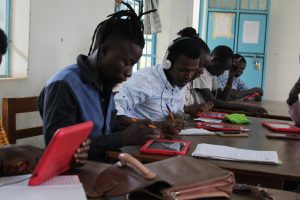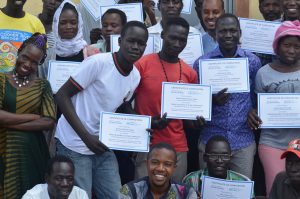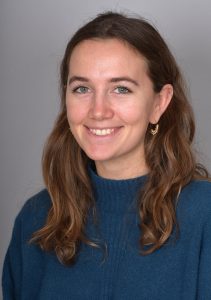Rethinking refugee education
Amala is developing the first international high school diploma programme for refugee youth, to address the need for refugee education.
With schools closing across the globe due to the uncertainties of Covid-19, it is a bleak insight into what a life without education would look like. Unfortunately, virus or no virus, this is a reality for many young refugees around the world. Today, 70.8 million people are displaced worldwide, and the IOM predicts this will increase to 200 million in 2050.
Among this population are huge numbers of children and youth who lack access to basic rights such as an education. In fact, while 63% of global refugees have access to primary education, only 24% are able to go on to secondary education, leaving just 3% with any pathways towards higher education. In developing countries, these figures are even lower, with only 9% of young refugees able to access secondary education.
A Long Journey towards Refugee Education
On top of this, due to slow asylum procedures and lack of resettlement options, refugees spend on average 15 years in displacement and are, therefore, often locked out of educational opportunities for their entire adolescence. Lack of capacity issues in local education systems, being above the age of 18, family and work responsibilities and conflict, socio-economic and financial disadvantages are further barriers that crop up preventing young refugees from learning.
Even those who are enrolled face an un-engaging and inflexible curriculum which fails to incorporate the needs of young refugees, or prepare them for a future they are likely to lead.
Addressing the Problem
Creating a high school diploma programme, designed for and by refugees, to address this growing problem is what we have been working towards at Amala, alongside refugee learners and educators, for the last three years. And this year, in Amman, Jordan, and Kakuma Camp, Kenya, we will be launching the Amala High School Diploma Programme, the first international high school diploma programme tailored to the needs of refugees. It will ensure that out-of-school refugees can continue their high school education and go on to access further opportunities and make a positive difference in their communities.
To ease the stress of studying and accessing education while needing to work and support family, students will study on a part-time basis at the weekends, through in person, class sessions led by a facilitator, and through independent, flexible, online study.


(Amala students)
Understanding the Different Needs
The labels and categories that are so embedded in our media, politics and narrative around migration, so often strip displaced youth of their agency. Recognising diversity and autonomy of youth whilst bridging the gap of quality secondary education is therefore at the heart of what Amala aims to achieve. If we fail to recognise and engage with the fact that displaced youth have their own sense of agency, identities, histories, networks, and knowledge, then we will fall short in identifying what they need, and what skills they can enhance on, to progress and continue on their life paths.
The diploma programme, therefore, draws the focus of learning towards the development of 21st-century skills by integrating subjects such as Maths, English etc. with interdisciplinary subjects, such as Ethical Leadership and Social Entrepreneurship, that hone in on our students’ wants and needs. In the lead up to the launch of the diploma programme, we have been running these subjects as short courses which have been accessed by over 300 displaced youth and young community members.
Fati, a Palestinian student from Amala’s short course ‘Peace-building in your community’ that took place last year in Amman, said:
“I learnt that I can be part of the solution, a part of fixing our society, after feeling hopeless of making any change for so long.”
With the launch of the Amala Diploma Programme later this year, we hope to enable more young refugees to jump back into education, but into one that they can take the reins of and steer in the direction that will most benefit themselves, and their community.

By Jessica Rapp, Programme Assistant at Amala (formerly Sky School), a nonprofit startup
that has developed the first international high school curriculum for refugees.
The startup addresses issues such as refugee education.
Please follow and like us:
Share this:
Rethinking refugee education
Amala is developing the first international high school diploma programme for refugee youth, to address the need for refugee education.
With schools closing across the globe due to the uncertainties of Covid-19, it is a bleak insight into what a life without education would look like. Unfortunately, virus or no virus, this is a reality for many young refugees around the world. Today, 70.8 million people are displaced worldwide, and the IOM predicts this will increase to 200 million in 2050.
Among this population are huge numbers of children and youth who lack access to basic rights such as an education. In fact, while 63% of global refugees have access to primary education, only 24% are able to go on to secondary education, leaving just 3% with any pathways towards higher education. In developing countries, these figures are even lower, with only 9% of young refugees able to access secondary education.
A Long Journey towards Refugee Education
On top of this, due to slow asylum procedures and lack of resettlement options, refugees spend on average 15 years in displacement and are, therefore, often locked out of educational opportunities for their entire adolescence. Lack of capacity issues in local education systems, being above the age of 18, family and work responsibilities and conflict, socio-economic and financial disadvantages are further barriers that crop up preventing young refugees from learning.
Even those who are enrolled face an un-engaging and inflexible curriculum which fails to incorporate the needs of young refugees, or prepare them for a future they are likely to lead.
Addressing the Problem
Creating a high school diploma programme, designed for and by refugees, to address this growing problem is what we have been working towards at Amala, alongside refugee learners and educators, for the last three years. And this year, in Amman, Jordan, and Kakuma Camp, Kenya, we will be launching the Amala High School Diploma Programme, the first international high school diploma programme tailored to the needs of refugees. It will ensure that out-of-school refugees can continue their high school education and go on to access further opportunities and make a positive difference in their communities.
To ease the stress of studying and accessing education while needing to work and support family, students will study on a part-time basis at the weekends, through in person, class sessions led by a facilitator, and through independent, flexible, online study.
(Amala students)
Understanding the Different Needs
The labels and categories that are so embedded in our media, politics and narrative around migration, so often strip displaced youth of their agency. Recognising diversity and autonomy of youth whilst bridging the gap of quality secondary education is therefore at the heart of what Amala aims to achieve. If we fail to recognise and engage with the fact that displaced youth have their own sense of agency, identities, histories, networks, and knowledge, then we will fall short in identifying what they need, and what skills they can enhance on, to progress and continue on their life paths.
The diploma programme, therefore, draws the focus of learning towards the development of 21st-century skills by integrating subjects such as Maths, English etc. with interdisciplinary subjects, such as Ethical Leadership and Social Entrepreneurship, that hone in on our students’ wants and needs. In the lead up to the launch of the diploma programme, we have been running these subjects as short courses which have been accessed by over 300 displaced youth and young community members.
Fati, a Palestinian student from Amala’s short course ‘Peace-building in your community’ that took place last year in Amman, said:
With the launch of the Amala Diploma Programme later this year, we hope to enable more young refugees to jump back into education, but into one that they can take the reins of and steer in the direction that will most benefit themselves, and their community.
By Jessica Rapp, Programme Assistant at Amala (formerly Sky School), a nonprofit startup
that has developed the first international high school curriculum for refugees.
The startup addresses issues such as refugee education.
World Water Day - March 22
National Workout and Wellbeing Wee...
KindLink Global Team
contact@kindlink.global
Preventing HIV through educati...
Supporting education in poor c...
Support and care for asylum se...